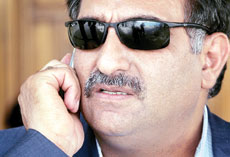RAMALLAH, West Bank, 3 May 2007 — Former Arab Balad Party chairman and Israeli Knesset member Azmi Bishara is suspected of spying for Hezbollah during the Second Lebanon War and providing the group with targets and classified military information, the Shin Bet (Israel Security Agency) announced yesterday.
Israeli media sources reported that the investigation, carried out by the Shin Bet and Israeli authorities over the past few years, revealed a long list of espionage-related charges.
Bishara is accused of transferring to Hezbollah information, predictions, assessments and recommendations about the political echelon, the Israeli Army and the Israeli public during the Second Lebanon War last summer (known in Lebanon as the July War).
Bishara is suspected of the following crimes: Assisting the enemy at a time of war; maintaining contact with a foreign agent; passing information to an enemy; money laundering; and terror financing. Authorities from Israel’s International Serious Crimes Unit questioned Bishara in March in Petah Tikva.
The charges revealed to the press yesterday represent only a fraction of the suspicions against Bishara that the Shin Bet and the police have against the former MK as part of their investigation. The investigation goes back years, before last summer’s clashes between Israeli forces and Hezbollah that took place mostly in Lebanon.
Israeli sources said that in addition to supplying information to a Hezbollah intelligence officer, Bishara was also — according to the Shin Bet — in contact with additional intelligence officials from other countries. Based on these suspicions, the Israeli Supreme Court permitted the police and the Shin Bet to tap Bishara’s telephone conversations, a tactic that can only be employed with a warrant from a judge.
Bishara, the Shin Bet said, also received detailed missions from Hezbollah.
According to the Shin Bet, during the war, Bishara reportedly gave advice to Hezbollah on how to “deepen their strikes against Israel.” He also gave advice concerning the effects of Hezbollah’s use of long-range missiles south of Haifa, and Israel’s response to the attacks. Bishara also allegedly transferred classified military information to Hezbollah and warned the militant group of alleged plans by Israeli to assassinate Hezbollah leader Shaikh Hassan Nasrallah.
“Bishara caused severe harm to the security of the state of Israel,” a high-ranking Shin Bet official said yesterday. “He maintained secret contact by secret lines of communication with Hezbollah ... he walked around the Knesset where decisions were being made by the prime minister, ministers and government officials.”
Bishara is also accused of receiving hundreds of thousands of dollars in illegal payments that were transferred from a money-exchange office in Jordan to a money-exchange office in east Jerusalem in envelopes, and from there to his home in Beit Hanina. Bishara is accused of receiving various envelopes containing $50,000 in cash apiece. The Shin Bet said however, money did not originate in Jordan, but came from a third country which officials have declined to name.
Lt. Amichai Shai, head of the Israel Police International Serious Crimes Unit, said that the police were considering requesting a judicial inquiry in Jordan to proceed with the investigation.
Shai said that it would be the first time that the state of Israel would ask to conduct an investigation in Jordan. “Azmi Bishara is wanted for questioning by the Israel Police” Shai said, adding that while the former MK was no longer in Israel, police and the Shin Bet planned to continue with the investigation.
The high-ranking Shin Bet official dismissed Bishara’s accusations of discrimination and said that the severe suspicions spoke for themselves.
“We will not be deterred from investigating anyone, even public officials or Knesset members that need to be investigated,” the official said, adding that Bishara was highly regarded by Hezbollah as an intellectual who not only had insight into the dynamics of the Middle East, but also into the ongoing of the state of Israel and the Jewish population there.
The four-month conflict between Israeli forces and Hezbollah last year killed hundreds of civilians and militants, mostly on the Lebanese side. The conflict left thousands of US-supplied Israeli cluster bomblets scattered in southern Lebanon that has claimed the lives of dozens of civilians and injuring over 200 since the cease-fire.
UNICEF reported in August 2006 that the death toll from the conflict stood at 1,020 with about 3,500 injured, mostly in Lebanon.
The UN also reported that about 30 percent of the casualties were children and that most of them were non-combatants.


